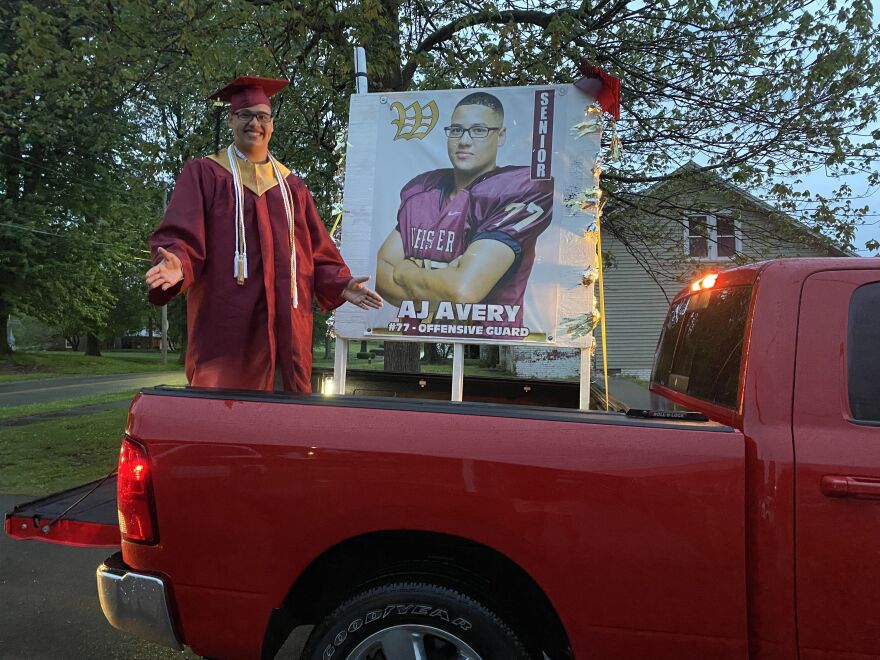It's graduation season. But thanks to the COVID-19 pandemic, ceremonies are likely to be anything but typical for the class of 2020. For seniors at Webster County High School in Dixon, Ky., that meant a no-contact, drive-through ceremony.
On Friday, 146 graduates and their families lined up in vehicles — many decorated with streamers, paint and balloons — at the school, each waiting for their chance to drive up to the entrance. Once there, the rules were simple: exit your family's car, walk up the red carpet, pick your diploma up off the table, pose for a quick picture and go back to your car.
No handshakes.
No hugging.
No contact whatsoever — even with the handful of school administrators standing more than six feet away.
Eighteen-year-old Ali Avery Jr., who goes by A.J., was one of the seniors who made this unusual walk to get his diploma.
A few days before the ceremony, which was live-streamed on YouTube, he told NPR that he was shocked when first heard he wouldn't get to receive his diploma in front of a crowded gymnasium.
"I didn't expect [COVID-19] to hit Webster County that fast," he said. "It doesn't seem real until it actually affects you."
Avery was also really looking forward to an in-person graduation because he had been voted by his classmates to give the commencement speech.
"To see my parents look at me, just to see their faces when I walk down and get my diploma," he said. "I think that's a real emotional moment for everybody and now we don't get that."

But after Friday's ceremony, during which he drove through in his family's red four-door pickup truck decorated with a huge banner noting his athletic and scholastic achievements, Avery's tune had changed. He was now acting like, well, someone who had just graduated high school.
"I feel great, it was bigger than I thought it would be, more people came out," he said. "It was just amazing."
For Webster County and its roughly 13,000 people, graduation is a big deal. There's only one high school, fed by the quintessential small, rural towns that dot the county nestled in the rolling hills of Western Kentucky. Once the drive-through ceremony ended, graduates returned to those towns to parade. They were greeted by friends, neighbors and family who, despite the rainy evening, lined the main thoroughfares to cheer them on.
Principal Jarrod Hankins said that because Webster County High School is a "multigenerational school," the community had to be involved in the altered graduation ceremony plans.
"Most of the grandparents went to school here, the parents went to school here, so the kids are going to school here," he told NPR.
Furthermore, it's typical for nearly 50% of a graduating class not to go to college, Hankins said, instead going straight into a trade or, until recently, the coal mines.
"This is the highest level of education that some students are going to have," he said. "So that's a special moment for that family."
A.J. Avery, who is headed to college in the fall, said, in the end, his graduation was actually very special. (And he did get to make the commencement address, it was just prerecorded.)
"It gave me goosebumps just hearing people call my name. Just feeling the love and support of the community was just amazing," he said. "They truly did something marvelous and unforgettable."
Copyright 2020 NPR. To see more, visit https://www.npr.org. 9(MDAxMzY2MjQ0MDEyMzcyMDQ5MzBhZWU5NA001))




